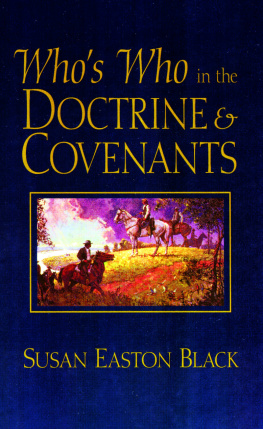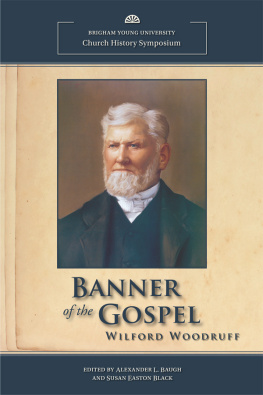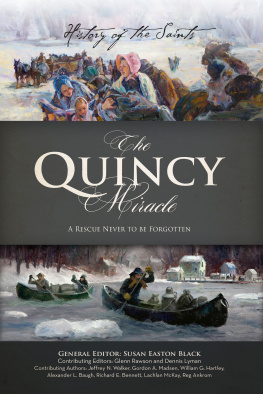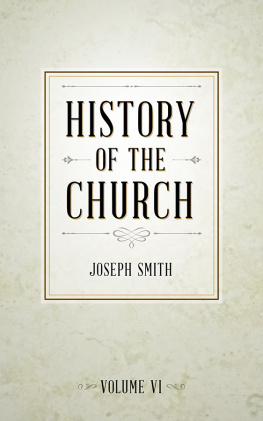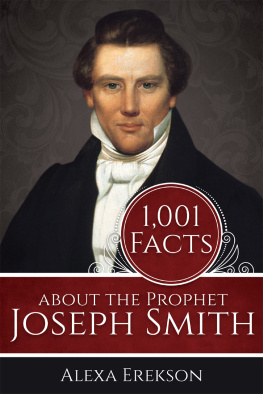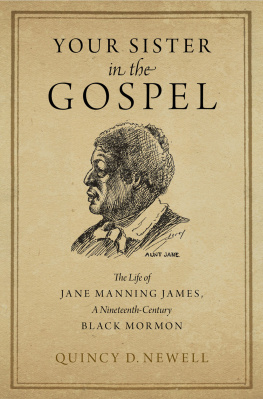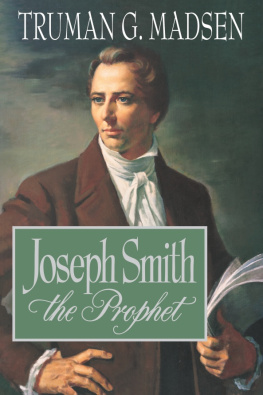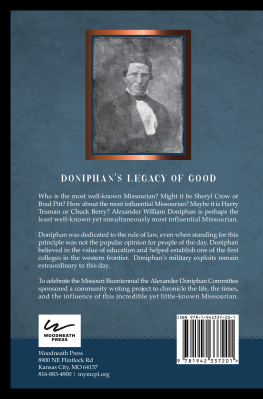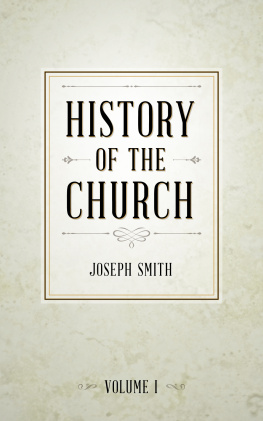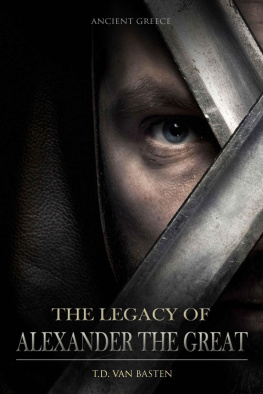Introduction
On November 1, 1839, Alexander Doniphan was ordered to carry out the execution of Joseph Smith and his fellow prisoners:
Sir:You will take Joseph Smith and the other prisoners into the public square of Far West, and shoot them at 9 oclock to-morrow morning.
Samuel D. Lucas
Major-General Commanding
Rather than comply with his superior officers order, Doniphan took the moral high ground and responded to Major General Lucas:
It is cold-blooded murder. I will not obey your order. My brigade shall march for Liberty tomorrow morning, at 8 oclock; and if you execute these men, I will hold you responsible before an earthly tribunal, so help me God!
A.W. Doniphan
Brigadier-General
I grew up thinking few men were as courageous as Alexander Doniphan. He risked his reputation and standing in the military in favor of a moral right. To me, he was a heroa man who could not be swayed.
Since then, I have learned that Alexander Doniphan was a complex man who had innumerable admirers but few close friends. He had opinions that were rarely popular with the majority, but their disapproval didnt bother him. His belief in the Manifest Destiny of the United States led him to enlist as a private in the Mexican-American War. By the time the war ended, he held the rank of colonel. Though he favored the Deep South in heritage and culture, Alexander Doniphan spoke of keeping the nation together rather than splitting the nation along the Mason-Dixon Line. When asked to run for governor of Missouri, he declined, choosing his family over politics.
At the Washington Peace Conference of 1861, President Abraham Lincoln said to Doniphan, And this is the Colonel Doniphan who made the wonderful march from Santa F to Monterey against both the Indians and Mexicans. Now, colonel, permit me to say you are the only man connected with any great military enterprise who ever came up... to my expectations.
Alexander Doniphan was not in step with his colleagues, his friends, or President Lincoln. Doniphan was his own man. He had strong opinions that were not subject to change. Despite his unwavering and stubborn personality, the people who knew him best admired him most. Doniphan was a brave man whose nobleness of soul and fierce loyalty to moral correctness made him one of the greatest Americans of the nineteenth century.
There is much to learn about the life of Alexander Doniphan. The purpose of Alexander Doniphan: Courageous Defender & Friend of the Saints is not to present a complete biography of his life. Remarkable biographies have already been written by Roger D. LauniusAlexander William Doniphan: Portrait of a Missouri Moderate (1997)and Joseph G. DawsonDoniphans Epic March: The 1st Missouri Volunteers in the Mexican War (1999). The purpose of this work is to present glimpses into the life of a courageous man whose moral compass was set. This work would not have been possible without the capable assistance of McKenna Swindle and Eliza Allen.
Joseph Smith, History of the Church of Jesus Christ of Latter-day Saints (Salt Lake City: The Church of Jesus Christ of Latter-day Saints, 1905), 3:246.
Smith, History of the Church, 3:246.
D. C. Allen, A Sketch of the Life and Character of Col. Alexander W. Doniphan (Liberty, MO, 1897), 2728, in Joseph Dawson, Doniphans Epic March: The First Missouri Volunteers in the Mexican War (Lawrence, KS: University Press of Kansas, 1999), 1.
Letter from Alexander Doniphan to John Doniphan, February 22, 1861, quoted in Gregory Maynard, Alexander William Doniphan, The Forgotten Man from Missouri, (masters thesis, Brigham Young University, 1973), 95.
Chapter One
Childhood and Youth
On July 9, 1808, when Thomas Jefferson was president of the United States, and Mason County, Kentucky, was part of the Deep South, Alexander William Doniphan was born. Known as Will to his friends, he was the youngest in his family of ten, living along the banks of the Ohio River near Maysville, Kentucky. He was named for his grandfathers, Alexander Doniphan and William Smith, proud military men of Virginia. His paternal grandfather had guarded the frontiers in the upper region of Richmond, Virginia, so that settlers scattered along the rivers could rest assured that their plantations were safe from American Indian attacks. His maternal grandfather, Captain William Smith, had protected his countrymen as well as their property as a soldier in the Virginia light horse militia.
His Parents
Doniphans parents, Joseph Doniphan and Anne Fowke Smith, were products of their Southern upbringing. Joseph Doniphan, like his father before him, had served in the military. Joseph enlisted in the Revolutionary War to fight against the tyranny of Great Britain. He fought in the battles at Yorktown and was present when General Cornwallis surrendered on October 19, 1781, and a free America was born.
With the war behind him and youthful adventures ahead, Joseph joined Daniel Boone and headed west. Doniphan wrote, My father came to Kentucky with Daniel Boone, just at the close of the Revolution. [He] taught the first school ever taught in Kentuckyat the solicitation of the families at Boonsborough. During that year, when not teaching school, fighting American Indians, hunting, or felling trees, twenty-two-year-old Joseph Doniphan returned to Virginia to court his sweetheart, Anne Smith.
Joseph and Anne were wed April 25, 1784, in Fairfax County, Virginia, near George Washingtons Mount Vernon home along the Potomac River. After six years of marriage and the birth of three children, Joseph was still regaling his wife, Anne, with stories of his year in Kentucky with Daniel Boone. When he learned of neighbors moving to the expansive green pastures of Kentucky, there was little that could keep Joseph in Virginia.
The Doniphans in Mason County, Kentucky
In 1790, Joseph and Anne Doniphan and their children left their moorings in Virginia and headed to Kentucky. They put down stakes and settled along the Ohio River in Kentons Station, five miles west of Maysvillethe county seat of Mason County. It was the same area where, earlier, Daniel Boone had set up a trading post and built a tavern. It was the very place Joseph had dreamed of living in for years.
The Doniphans move was not as we might imaginea young family having little and eking out a living, scratching the ground and felling trees like most pioneers coming to Kentucky. Joseph Doniphan was not an upper-tier Southerner who had left a mansion and row houses of slaves behind in Virginia, but he was not a pauper either. Joseph had slaves to work his fields and money to fulfill his dreams. It did not take long before he became a prosperous gentleman farmer in Kentons Station. From crops to investments in the region, nothing of a financial nature soured in his hands. He shipped hemp and tobacco to market on barges from the Maysville port along the Ohio River. With his ever-increasing prosperity came a greater sense of dignity to hima sense of entitlement.
To keep undesirables from trespassing on his land or stealing his slaves, Joseph used his military skills, which served himself and his community. He was elected by townsfolk to be the sheriff of Maysville. Few neer-do-wells wanted to tangle with Sherriff Joseph Doniphan. He was not only a formidable officer of the law; he was also an up-and-coming gentleman who embraced the Southern ways. He had wealth, toiling slaves, a good marriage, and a military presence about him.
Doniphans Father Dies
My father died in March, 1813, when I was less than five years old, Doniphan said. Josephs death at Clarks Run in Mason County was unexpected, yet days before his demise, Joseph wrote his last will and testament. In that legal document, he named as beneficiaries his wife and their seven living children: Thomas Smith Doniphan (age twenty-six), George Doniphan (age twenty-three), Margaret Doniphan (age twenty-one), Susannah Doniphan (age nineteen), Lucy Doniphan (age nine), Matilda Doniphan (age nine), and Alexander William Doniphan (age four).



